When you're relying on well water for your household, ensuring its safety is non-negotiable. You can't overlook the importance of selecting an effective water purifier tailored for your specific needs. Among the top contenders, you'll find options like the HQUA-TWS-12 Ultraviolet Water Purifier, which targets harmful bacteria and viruses, and the Aquasana Whole House Filter System, renowned for its extensive filtration process. However, each purifier offers distinct features that cater to various concerns. So, which one aligns with your requirements and provides peace of mind? Let's explore the best choices together.
HQUA-TWS-12 Ultraviolet Water Purifier Filter for Whole House Water Purification
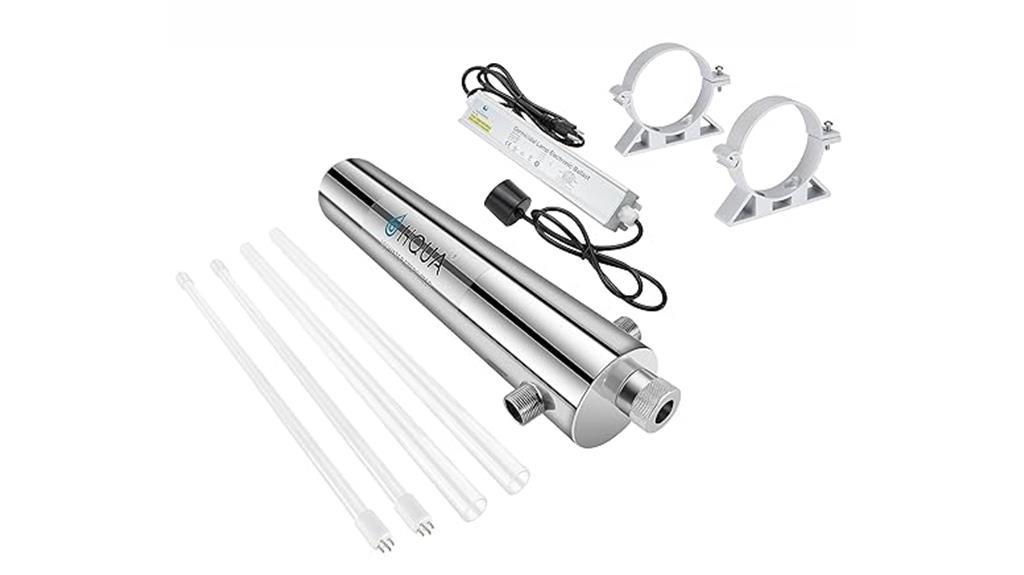
If you're looking for a reliable water purification solution for your well water, the HQUA-TWS-12 Ultraviolet Water Purifier is an excellent choice. With a capacity of 12 gallons per minute, it effectively reduces bacteria and viruses, ensuring your family's safety. I appreciate its compact design—only 21 inches long and 3.5 inches in diameter—which simplifies installation. The system's UV bulb lasts up to 9,000 hours, providing long-term performance. While I found the installation straightforward, some users did need extra fittings, so keep that in mind. Customer service has been responsive when issues arise, which adds peace of mind. Just remember, the ballast isn't certified for North America, so weigh that in your decision. Overall, it's a solid option for well water purification.
Best For: Families seeking a reliable and effective whole house water purification solution for well water.
Pros:
- Effective bacteria and virus reduction ensures safe drinking water for your household.
- Compact design simplifies installation and saves space in your plumbing setup.
- Responsive customer service provides support and replacement parts when needed.
Cons:
- Ballast safety certification is lacking for North America, raising potential safety concerns.
- Installation may require additional fittings, which could complicate the setup for some users.
- Reports of power supply failures within a few months, affecting long-term reliability.
Aquasana Whole House Well Water Filter System (EQ-WELL-UV-PRO-AST)
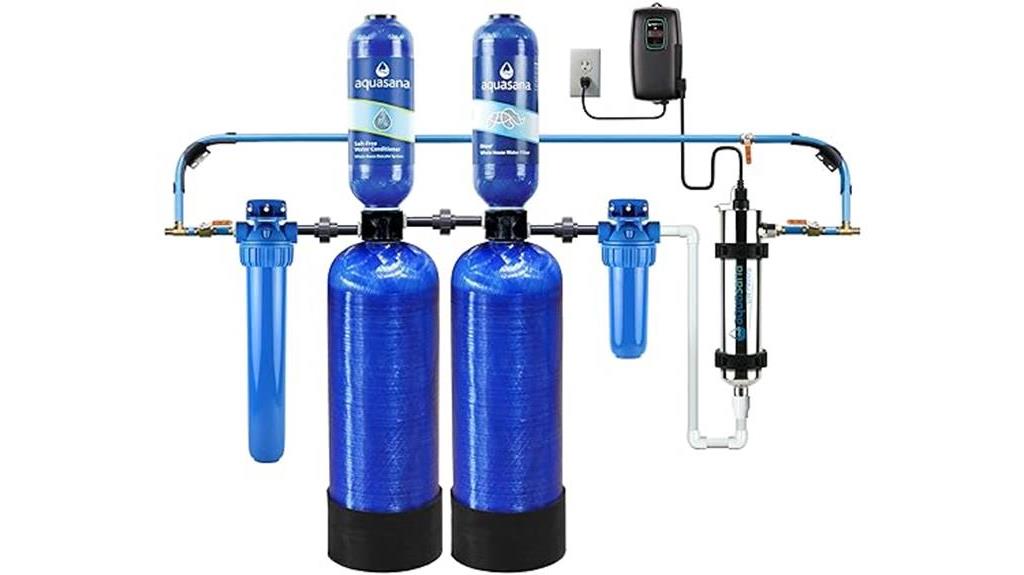
The Aquasana Whole House Well Water Filter System (EQ-WELL-UV-PRO-AST) is an excellent choice for households relying on well water, especially those concerned about contaminants like bacteria and heavy metals. This system combines a UV purifier, salt-free descaler, and carbon and KDF media filters, effectively reducing up to 97% of chlorine and harmful pollutants. I love that it provides clean water from every tap without stripping essential minerals. Plus, it delivers water for under $0.01 per gallon, making it cost-efficient. Installation is straightforward, but I recommend professional help for ideal results. While many users rave about the water quality, watch out for potential installation issues and verify you have reliable customer support if needed.
Best For: Households relying on well water who want to ensure clean, safe drinking water while retaining essential minerals.
Pros:
- Provides up to 97% reduction of chlorine and harmful contaminants.
- Cost-efficient, delivering clean water for less than $0.01 per gallon.
- Easy filter replacements and straightforward installation options.
Cons:
- Some users report installation challenges and potential leaks.
- Concerns about the durability of plastic components.
- Customer service responsiveness may vary, causing potential issues.
HQUA Whole House Ultraviolet Water Purifier Filter (120V 40W)
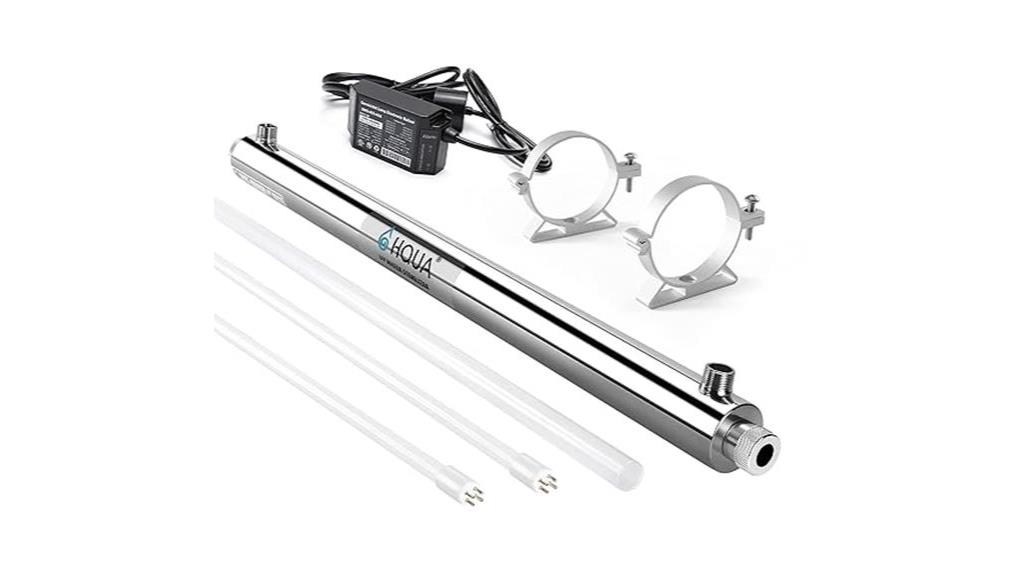
Looking for a reliable water purification system for your well water? The HQUA Whole House Ultraviolet Water Purifier Filter (120V 40W) might be just what you need. With a flow rate of 12 GPM, it effectively eliminates harmful bacteria while leaving your water tasteless and odorless. I found the installation to be straightforward, taking me about 30 minutes without needing a plumber. The stainless steel chamber and quartz glass guarantee durability, and the included extra UV bulb is a thoughtful touch. I appreciate that it's chemical-free, maintaining the natural qualities of my water. Plus, the responsive customer support made me feel secure in my purchase. Overall, this purifier stands out for its quality and affordability.
Best For: Those seeking an effective, chemical-free water purification solution for well water in a residential setting.
Pros:
- Easy installation: Can be set up in about 30 minutes without the need for professional plumbing help.
- Durable materials: Constructed from 304 stainless steel and quartz glass, ensuring longevity and reliability.
- Effective performance: Successfully eliminates harmful bacteria and odors, providing clean, tasteless water.
Cons:
- Bulb installation challenges: Some users report difficulties during the installation of the UV bulb, with a risk of breakage.
- Sealant requirement: Using thread seal tape is recommended to prevent leaks, which may add to the installation process.
- Potential for parts replacement: While customer support is responsive, some users have experienced the need for replacements of bulbs and parts.
UV Water Purification System 55W
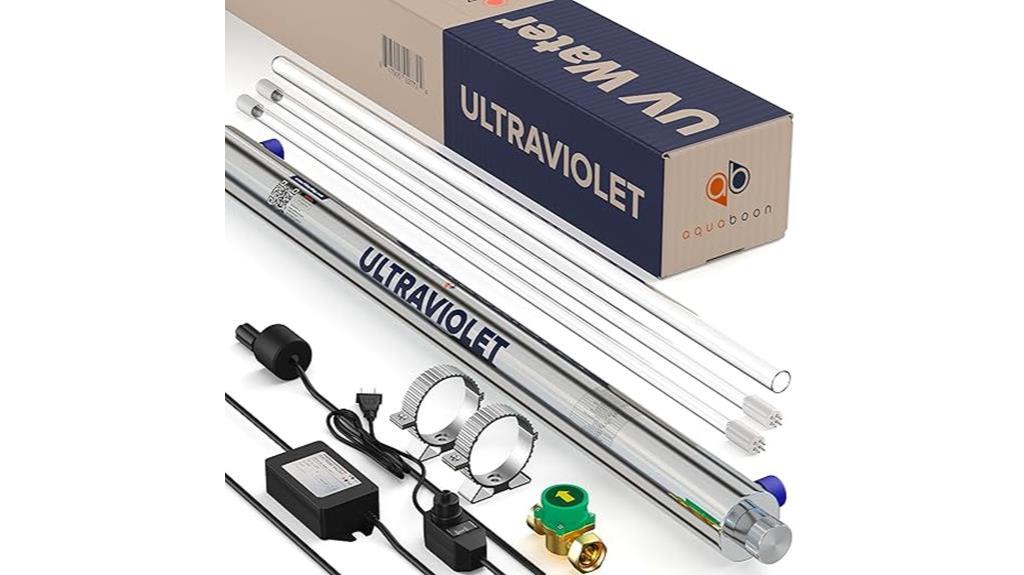
For those seeking a reliable solution to purify well water, the UV Water Purification System 55W stands out with its impressive ability to eliminate up to 99.99% of harmful microorganisms. This system effectively disrupts the DNA of bacteria and algae using ultraviolet rays, ensuring safe drinking water. I found the installation process straightforward, with all necessary components included in the all-inclusive package. The smart flow sensor and 12 GPM flow rate enhance its performance, though I recommend running it at 8 GPM for better UV exposure. While I appreciate its stainless steel durability, I did encounter some concerns about the quality of certain components. Overall, it's a solid choice, with annual bulb replacement being an essential maintenance step.
Best For: Those looking for an effective and durable UV water purification solution for well water treatment.
Pros:
- Highly effective: Achieves 99.99% reduction in harmful microorganisms.
- User-friendly installation: Straightforward setup with all necessary components included.
- Durable construction: Made from stainless steel for long-lasting use.
Cons:
- Component quality concerns: Some users report issues with the durability of fittings and flow switches.
- Flow sensor issues: Reliance on water flow can lead to operational problems.
- Instructions lack clarity: Some users find the installation instructions confusing, leading to mistakes.
Purewell 3-Stage Ultra-Filtration Gravity Water Filter System
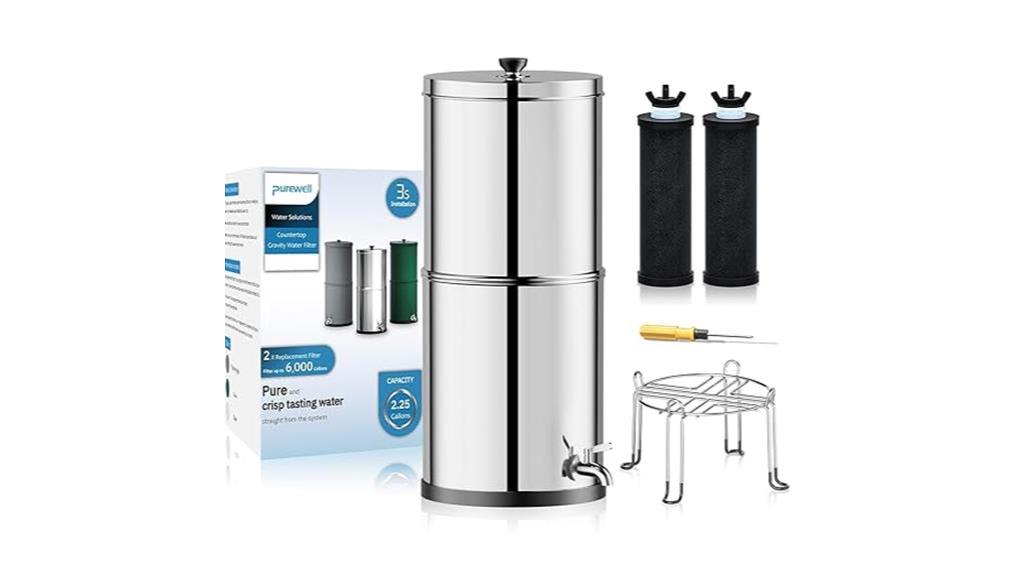
When you need a reliable solution for purifying well water, the Purewell 3-Stage Ultra-Filtration Gravity Water Filter System stands out with its impressive 0.01-micron filtration capability. This NSF/ANSI certified system effectively reduces 99% of chlorine and boasts a 2.25-gallon capacity. Its three-stage filtration combines a black carbon filter, silver ion membrane, and activated carbon block, filtering out 99.99% of contaminants.
I appreciate its durable 304 stainless steel design, and there's no need for electricity—making it perfect for both indoor and outdoor use. While it takes about 1.5 to 2 hours to filter nearly 2.25 gallons, the improved taste and environmental benefits make it worth the wait. Just remember to replace the filters every six months!
Best For: Those seeking an effective and environmentally friendly water purification solution for both home and outdoor use.
Pros:
- NSF/ANSI certified for safety and effectiveness in reducing chlorine and contaminants.
- Durable 304 stainless steel construction ensures longevity and stylish design.
- No electricity required, making it versatile for various settings.
Cons:
- Slow filtration speed, taking 1.5 to 2 hours for nearly 2.25 gallons.
- Potential for leaks if not installed properly or if washers are missing.
- Filter replacement needed every six months, which adds to ongoing maintenance.
Factors to Consider When Choosing Water Purifiers for Well Water
When choosing a water purifier for your well water, you need to take into account several key factors. Think about the filtration technology efficiency, installation complexity, and maintenance requirements to find the right fit for your needs. It's also essential to assess the contaminant reduction capabilities and how well the system performs in hard water conditions.
Filtration Technology Efficiency
Choosing the right water purifier for well water hinges on understanding filtration technology efficiency. You need to focus on how effectively a system can remove contaminants specific to well water, such as bacteria, viruses, chlorine, and heavy metals. Look for systems that offer up to 99.99% reduction in harmful microorganisms, particularly those utilizing UV purification methods.
Consider the pore size of the filters. Membranes with a pore size of 0.01 microns will filter out a higher percentage of pathogens compared to larger sizes. Multi-stage filtration systems that combine various technologies—like activated carbon, KDF media, and UV purification—can considerably enhance contaminant removal while improving water taste and quality.
Don't overlook the flow rate, either. Measured in gallons per minute (GPM), this determines how quickly your water can be purified. A higher flow rate guarantees adequate exposure time for effective disinfection. Finally, regular maintenance and timely replacement of filter components are essential. Some systems may recommend filter changes every six months to maintain peak performance, ensuring you get safe, clean drinking water consistently.
Installation Complexity
Installing a water purifier for well water can be a straightforward or challenging task, depending on the system you select. Some purifiers are designed for DIY-friendly setups, making installation easier, while others may require professional help for peak performance. Before you commit to a system, check whether it comes with a thorough installation kit. Even with a kit, you might need additional tools and materials, which could complicate the process.
Take note of specific recommendations regarding pipe materials; using metal pipes, for example, can prevent overheating and chemical release. This consideration might affect your installation choices. You should also be aware that installation time can vary greatly—anywhere from 30 minutes to several hours—based on the complexity of the system and your plumbing experience.
Lastly, check the compatibility of the purifier with your existing plumbing. You may need extra fittings or sealants, so carefully review the installation requirements before making a purchase. By doing your homework, you can guarantee a smoother installation process and enjoy safe drinking water sooner.
Maintenance Requirements
Regular maintenance is essential for keeping your water purifier for well water operating effectively. Many systems require filter replacements every 2 to 6 months, so it's important to track your usage and water quality. If you choose a UV purification system, remember that you'll need to replace the UV bulb annually. Over time, the efficiency of these bulbs diminishes, potentially compromising your water safety.
Additionally, some purifiers have components like quartz sleeves and ballasts that may need periodic inspection and replacement. Staying on top of these checks can help maintain peak performance. Keep an eye on the operational status indicators in your UV systems; alerts may signal the need for immediate maintenance or troubleshooting.
Proper sealing during installation is also essential. Using thread seal tape or pipe dope can prevent leaks, which is key for the longevity and effectiveness of your purification system. By prioritizing these maintenance requirements, you'll guarantee that your water purifier continues to provide safe, clean drinking water for you and your family. Regular attention to these details can save you from larger issues down the road.
Contaminant Reduction Capabilities
When it comes to ensuring safe drinking water from your well, understanding the contaminant reduction capabilities of different purifiers is vital. Well water can harbor a range of contaminants like bacteria, viruses, chlorine, sediment, pesticides, and heavy metals. Consequently, choosing a system that effectively targets these contaminants is imperative.
For instance, systems that utilize ultraviolet (UV) purification can eliminate up to 99.99% of harmful microorganisms by disrupting their DNA, ensuring your water is pathogen-free. If you're concerned about a broader array of contaminants, consider multi-stage filtration systems, which can remove up to 97% of chlorine, rust, silt, and even industrial solvents.
Keep in mind that the effectiveness of these systems can depend on factors like flow rate and design. Ideal exposure time to UV light plays a significant role in enhancing pathogen removal rates. Finally, don't overlook the importance of regular maintenance. Timely replacement of filters and UV bulbs is key to maintaining the contaminant reduction capabilities of any purification system, ensuring you consistently enjoy safe and clean drinking water.
Performance in Hard Water
Choosing the right water purifier for hard water involves several key factors that can greatly impact performance and longevity. First, verify the system can handle hardness levels typically below 15 grains per gallon. This is vital for peak performance and preventing scaling in your plumbing and appliances.
Look for purifiers equipped with salt-free descalers. These systems minimize mineral buildup without adding any chemicals, preserving the healthy mineral content in your water. Additionally, filters with specific media, like KDF or activated carbon, can effectively reduce contaminants while softening the water.
Regular maintenance is essential. Timely filter replacements keep your purifier operating efficiently in hard water conditions and prevent clogging. You don't want to deal with unexpected issues down the line.
Lastly, consider the flow rate. Systems with a high flow rate, such as 12 GPM, are ideal for households with high water usage. They guarantee consistent water quality even during peak demand, making your daily routines smoother. By focusing on these factors, you can choose a system that not only purifies your water effectively but also stands the test of time.
Flow Rate Considerations
In considering a water purifier for well water, flow rate plays a significant role in guaranteeing you have consistent access to clean water throughout your home. The flow rate determines how much water your purifier can treat per minute, with common rates for whole house systems ranging from 12 to 15 gallons per minute (GPM).
A higher flow rate allows you to use multiple water outlets simultaneously, so all your taps can provide clean water without interruption. It's vital to match the purifier's flow rate with your household's peak water usage; otherwise, you might experience a drop in water pressure, which can compromise purification effectiveness.
If you choose a system with a lower flow rate, be aware that it may require longer exposure times to UV light or filtration media, potentially impacting how well it removes contaminants. Additionally, consider how the flow rate aligns with your existing plumbing systems to avoid installation issues and guarantee peak performance. By taking these factors into account, you can select a water purifier that meets your needs and keeps your family safe with clean drinking water.
Chemical-Free Options
For well water purification, chemical-free options offer a safe and effective solution without introducing harmful substances. These systems utilize methods like ultraviolet (UV) light to eliminate microorganisms, ensuring your drinking water remains pure. By avoiding chlorine or other chemical disinfectants, you can maintain the natural taste, color, and odor of your water, preserving its original quality.
One of the standout features of chemical-free purifiers is their ability to reduce up to 99.99% of bacteria and viruses. This means you can trust that your water is safe to drink without the worry of chemical residues. Additionally, these systems often work well with various filtration methods, enhancing overall water quality while keeping essential minerals intact.
Durability is another advantage; many chemical-free purifiers use materials like stainless steel, which resist corrosion and support a long-lasting purification process. When considering a water purifier for your well water, a chemical-free option can provide peace of mind, ensuring your family has access to safe, clean drinking water without compromising on quality.
Certification and Safety Standards
When it comes to guaranteeing the safety and quality of your well water, certification and safety standards play a significant role. When selecting a water purifier, you should prioritize systems that meet relevant safety certifications like UL, CSA, or ETL. These certifications assure compliance with North American standards, confirming the product has undergone rigorous testing for safety and performance. This helps prevent potential health risks associated with unregulated water purification systems.
Pay attention to NSF/ANSI certifications as well, which validate the effectiveness of the purification process in reducing contaminants, including harmful microorganisms and chemicals. If a purifier lacks certification, it might indicate issues with the materials used or the system's overall reliability, putting your drinking water at risk.
Understanding the certification process enables you to make informed decisions about the quality and safety of the water purification systems you choose for your well water. By choosing certified products, you're taking vital steps to protect your family's health and guarantee that the water you consume meets necessary safety standards.
Frequently Asked Questions
How Often Should I Replace Filters in Water Purifiers?
You should replace filters in your water purifier regularly to guarantee it works effectively. Most manufacturers recommend changing them every 6 to 12 months, but it depends on your water quality and usage. If you notice a change in taste or flow rate, it's a good sign the filter needs replacing. Keep an eye on the filter indicator, if your purifier has one, to stay ahead of maintenance and guarantee clean drinking water.
Can These Purifiers Remove Heavy Metals From Well Water?
Imagine you're a miner, digging for gold but uncovering toxic metals instead. Heavy metals in well water can be just as harmful. Fortunately, many water purifiers are designed to tackle this issue. They use advanced filtration methods, like reverse osmosis or activated carbon, to remove heavy metals effectively. It's essential to check the specifications of your chosen purifier, ensuring it specifically states its capability to eliminate those contaminants for safe drinking water.
Are These Purifiers Energy-Efficient for Long-Term Use?
When considering energy efficiency, you'll find that many modern water purifiers are designed to minimize energy consumption. They often use advanced filtration technologies that require less power compared to older models. Regular maintenance can also enhance their efficiency, helping you save on energy costs over time. When choosing a purifier, look for energy star ratings or specifications that indicate low power usage to guarantee long-term savings while keeping your water clean.
What Is the Average Lifespan of a Water Purifier?
Imagine a sturdy oak tree, standing tall for decades, providing shade and shelter. Similarly, a water purifier's average lifespan typically ranges from 5 to 15 years, depending on its type and maintenance. Regular filter changes and proper care can extend its life, much like nurturing that oak. By keeping an eye on performance and replacing components as needed, you'll guarantee your purifier serves you well, providing safe, clean water for years to come.
Do I Need a Professional Installation for These Systems?
You don't always need a professional installation for water purification systems, but it depends on your comfort level and the complexity of the system. If you're handy and the instructions seem straightforward, you can probably handle it yourself. However, if the installation involves plumbing or electrical work, hiring a professional might be the safer choice. It guarantees everything's set up correctly and helps avoid potential issues down the line.
Wrapping Up
Choosing the right water purifier for your well water is like picking the right shield for a knight. Just as a knight needs armor to defend against unseen threats, your home needs a reliable purifier to safeguard your family's health. By selecting one of the top options, you're not just filtering water; you're ensuring peace of mind and a healthy future. So, equip your home wisely, and let clean water be the foundation of your family's strength.

Hi, I’m Charlie, and I cover all things laundry here at Appliance Mastery.
I’ve spent over eight years working on washing machines, dryers, and dishwashers. I also have a degree in mechanical engineering, which helps me understand how these appliances really work.
I try to make every guide clear and practical. If you’re stuck with a noisy dryer or a leaking washer, I’ll help you figure out what’s wrong and how to fix it.
